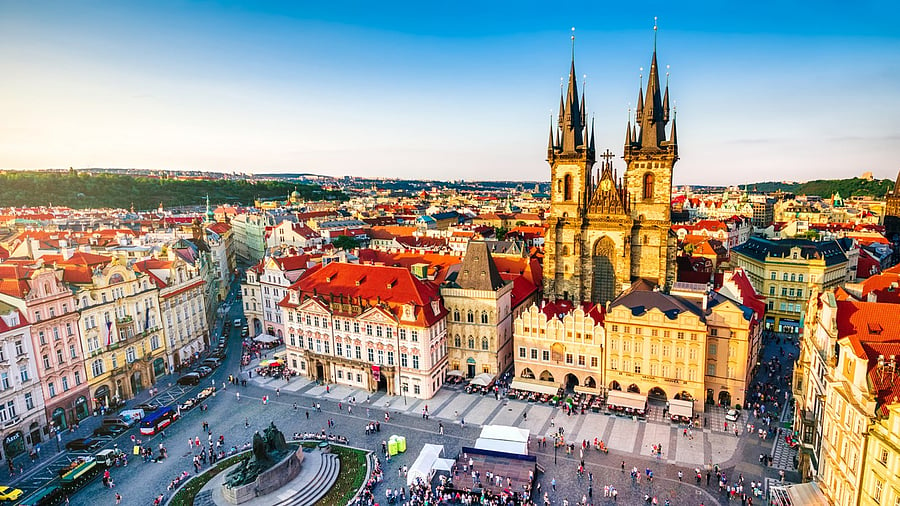
The lovely old town square of Prague.
Credit: Special arrangement
Presumably, for those like me who read The Da Vinci Code before watching it, Robert Langdon remains a rather desirable man. Dan Brown’s tweed-clad Harvard symbologist is both brainy and brawny; he also sports a Mickey Mouse watch for that touch of boyish charm. He decodes ancient mysteries like the professional sleuth he is — but now, rather lamentably, he has, in our collective imagination, the somewhat haggard face of Tom Hanks, who plays him in the film adaptation.
In The Secret of Secrets, Brown’s latest thriller after an eight-year hiatus, the action shifts to Prague—an inspired choice, really, for a writer so fond of mixing myth, science, and art, and of sending his indefatigable professor sprinting across historic bridges and crumbling staircases.
This time, Langdon reunites with noetic scientist Katherine Solomon (last seen in The Lost Symbol), and there’s a bit more spark in the professor’s personal life than in earlier editions. The pair have landed in Prague for Katherine’s guest lecture about her new book, which questions the very way we perceive consciousness. Trouble, of course, arrives on cue: several powerful people want the manuscript destroyed, and the author herself conveniently disappears.
Contemporary touch
Fans of Dan Brown — are you not already sniffing the formula? Oh, you are. Are there cryptic symbols? Yes. Ancient labyrinths? Indeed. Secret codes? Naturally. Greedy scientists and greedier billionaires? Absolutely. A selective, often dubious, mingling of fact and fiction? But of course! Yet this is a formula that still fizzes. Brown remains masterful at maintaining momentum; every brisk, bite-sized chapter ends with a cliffhanger that doesn’t feel forced. And for the trivia lovers, there’s plenty of “let-me-google-that” fodder scattered throughout to keep minds happily racing.
What really works this time around is the novel’s contemporaneity and its thematic daring. The study of human consciousness is buzzing in both science and philosophy, and the question Katherine poses — what if consciousness itself is the secret of secrets — feels timely and provocative. Brown dips liberally into pseudoscience and metaphysical speculation, but his straight-faced seriousness somehow makes it all believable enough to suspend disbelief. Before you can roll your eyes, you’re already turning the next page. Cleverly, he doesn’t allow you much time to breathe—or think too critically.
Perfect playground
And then there’s Prague, the perfect playground for Brown’s brand of cerebral adventure. In this gorgeously mysterious city, every statue on the Charles Bridge and every coded carving seems to shimmer with significance. The city itself feels like a secret the author is guarding jealously—an accomplice to the golem, that clay-masked sentinel lurking in shadows. Brown’s prose glows brightest when capturing Prague’s Gothic atmospherics: its cobblestone whispers, its alchemical legends, its rain-polished spires. The writing, however, falters when it strays into dialogue. Natural conversation, as ever, remains Brown’s Achilles’ heel.
The Secret of Secrets doesn’t quite shock the way The Da Vinci Code once did, but it’s gentler, more introspective in tone. It flits deftly from quantum entanglement to near-death experiences, from cosmic energies to out-of-body phenomena. The tropes are evident, the pattern familiar — but Brown’s pacing and confident sleight of hand ensure the journey remains gripping. He ducks under clichés, races around predictability, and somehow crosses the finish line triumphantly, even if you can see the track from miles away.
Brown paradox
That said, Brown, as is his wont, isn’t big on subtlety. Midway through, the prose grows as dense and sweet as Shropshire fudge; at times, it reads like a transcript from a TED Talk — topics ranging from ancient symbols and museum artefacts to the “code of consciousness” and quantum energy. All this results in a doorstopper of nearly 700 pages that could have benefited from a firm, unsentimental editor with a red pen.
Still, that’s the paradox of Dan Brown. You might skim his romantic interludes with mild embarrassment, yet you can’t resist finding out how it all ends. He’s an expert at serving up ambitious tales, irresistible conspiracies, and just the right balance of intellect and intrigue. While he’s never pretended to be a highbrow literary stylist, he knows precisely how to craft high-speed, cleverly constructed fun. And as a bonus, his novels always double as first-class travel brochures — you’ll close this one yearning to visit, or revisit, Prague.
In one sense, The Secret of Secrets occupies that middle ground between history lesson and feverish thriller. For all its ambition and density, it nudges us to reflect anew on a few fundamental questions we seem to have neglected. Are some secrets best left alone? Or is the greatest secret already known to us — one we simply refuse to acknowledge?